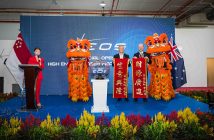 WA Premier Mr. Colin Barnett told ABC Radio a week before CHOGM, “I don’t expect there to be arrests and I don’t expect there to be trouble.” Well, he was almost right.
WA Premier Mr. Colin Barnett told ABC Radio a week before CHOGM, “I don’t expect there to be arrests and I don’t expect there to be trouble.” Well, he was almost right.
The Queen flew into Perth, formally opened CHOGM, held a formal dinner and attended a public barbeque event before departing Australia for what may have been the last time. The Queen’s visit was incident free and Her Majesty congratulated the WA Premier and the public for “a most beautiful” CHOGM.
Operation Demille – after film director Cecil B. DeMille, famous for his large-scale Hollywood blockbusters, was responsible for securing the event and was a great success. But with a state police budget of $48 million, nor was it cheap.
As CHOGM approached, the government provided $125,000 to set services up for the city’s homeless, CHOGM street banners were raised, traffic signs began displaying traffic event warnings and an increasing visible presence of police appeared at the ten or so venues around the city and parts of the metropolitan area.
Security in central Perth was buoyed by a highly visible police presence and the deployment of street access barriers and visible street signage and footpath placards depicting central Perth as a secure zone, pursuant to the control and the powers of the CHOGM Act.
Uniformed and plain clothes police officers ringed the Queen’s residence, Government House, with officers stationed every 20 metres outside the grounds, with more on the inside.
Likewise, there was a heavy police presence at key hotels and the key CHOGM sites of the Perth Convention and Exhibition Centre and State Reception Centre in Kings Park. Other official functions were held in Fremantle, Cottesloe and Burswood.
CHOGM attracted more than 4,000 delegates and heads of state from more than 50 countries representing one-third of the global population. Among the delegates were 140 internationally protected persons and their family members. Those people moved more than 5,000 times with police providing close personal protection (CPP) every time they did.
In a security context, WA Police Deputy Commissioner Mr Chris Dawson described the strategy as “friendly vigilance” as he briefed more than 400 senior officers during a meeting at Burswood in early October.
WA purposely did not want to adopt the approach Sydney was criticised for during the APEC Summit in 2007, in particular the use of concrete barriers and fences. Police were meticulous about how they balanced public access to secure areas, as well as provide the layers of protection needed for heads of state. Mr. Dawson told local media, “It would have been much easier to put those barriers up and a more sterile environment. But the way it was able to be delivered I think was a tremendous outcome for everyone.”
An observation here is the difference between APEC and CHOGM, in particular with the obvious absence of the US President in Perth. Having considered the degree of security surrounding Barrack Obama’s recent visit to Canberra and Darwin, the ‘friendly vigilance’ approach may not have been possible in some areas at the direction of the Secret Service.
Operation Demille involved the training of the State’s crime squad detectives to conduct CPP, recruit and officer riot training, re-equipping front line officers with riot and protective accoutrements, extensive electronic surveillance installations feeding back to a new Command Centre. The operation also included the use of state intelligence resources, including telephone interceptions, undercover operatives, police and military snipers, aircraft and vessels. Consider also the need for WA Police to engage with a diverse stakeholder base, including federal, state and local government departments and agencies…
To read the full story, make sure you subscribe now! Go to http://www.malaysiasecuritymagazine.com/subscribe/ and purchase either a 1 year or 3 year subscription today!




